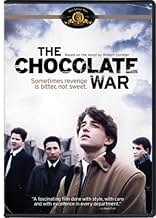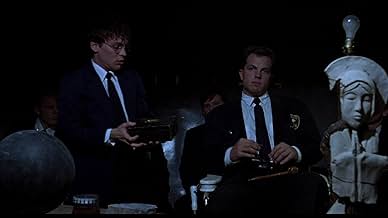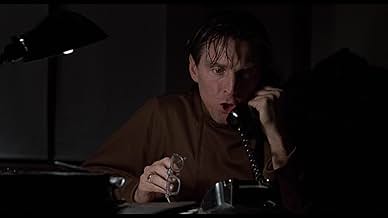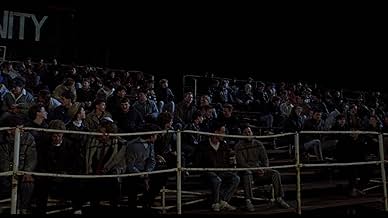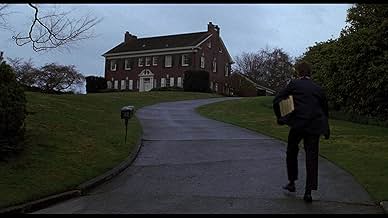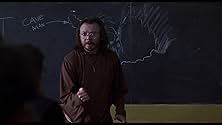IMDb RATING
6.6/10
2.6K
YOUR RATING
The Vigils are a gang of students at Trinity Catholic School... part of the tradition. They control the other boys by intimidation and the threat of violence.The Vigils are a gang of students at Trinity Catholic School... part of the tradition. They control the other boys by intimidation and the threat of violence.The Vigils are a gang of students at Trinity Catholic School... part of the tradition. They control the other boys by intimidation and the threat of violence.
- Director
- Writers
- Stars
- Awards
- 2 nominations total
Wallace Langham
- Archie
- (as Wally Ward)
Brent David Fraser
- Emile Janza
- (as Brent Fraser)
- Director
- Writers
- All cast & crew
- Production, box office & more at IMDbPro
6.62.5K
1
2
3
4
5
6
7
8
9
10
Featured reviews
A brilliant film with echoes of Lord of the Flies
My perspective on this film is likely to be unique, in that I've never read the book. The critical reception and most user reviews widely criticize Keith Gordon's re-writing of the book's ending and this was ultimately reflected in its shocking performance at the box office. If you've never read the book, you can effectively ignore all criticism, because The Chocolate War is arguably one of the finest films to explore the dark underbelly of teenage cruelty, manipulation and the childhood induction of the mob mentality and a superb directorial debut for Keith.
John Glover's performance as the twisted and politically carnivorous Brother Leon is stunning and easily his best work. With echoes of Lord of the Flies, The Chocolate War explores the outer reaches of cruelty, fear and control exercised by the two antagonistic forces of the student led secret society The Vigils, and the school's acting school head - Brother Leon. Anyone who has ever been bullied or coerced to side with bullies out of the necessity for self-preservation will find a string of painful moments to relate to in this film.
The soundtrack is a masterpiece of emotion. The intro to Peter Gabriel's "We Do What We're Told" is used as a recurring musical theme providing an atmospheric backdrop to the web of cruelty and manipulation that unfolds for Jerry the protagonist. But the revelation is the haunting piano of "Shepherd's Song" by Scott Cossu, which holds the space for Jerry's introspection, his loss and the tragedy of his situation.
Yes, there are some elements lacking in this film - namely the performance of the hero (Jerry) played by Ilan Mitchell-Smith and some of the dated directorial techniques adopted by Keith Gordon for the flashback sequences and other scenes. However the strength of the story, soundtrack and performances from John Glover and Wallace Langham tower above the film's shortcomings. Keep in mind this was Gordon's feature film directorial debut.
I'm not going to comment on the ending, other than to say it works perfectly for the narrative of this film and is in no way disappointing. To the contrary, it still moves me to tears despite more than half a dozen viewings of this film over the years.
The Chocolate War is difficult to find but absolutely essential viewing.
John Glover's performance as the twisted and politically carnivorous Brother Leon is stunning and easily his best work. With echoes of Lord of the Flies, The Chocolate War explores the outer reaches of cruelty, fear and control exercised by the two antagonistic forces of the student led secret society The Vigils, and the school's acting school head - Brother Leon. Anyone who has ever been bullied or coerced to side with bullies out of the necessity for self-preservation will find a string of painful moments to relate to in this film.
The soundtrack is a masterpiece of emotion. The intro to Peter Gabriel's "We Do What We're Told" is used as a recurring musical theme providing an atmospheric backdrop to the web of cruelty and manipulation that unfolds for Jerry the protagonist. But the revelation is the haunting piano of "Shepherd's Song" by Scott Cossu, which holds the space for Jerry's introspection, his loss and the tragedy of his situation.
Yes, there are some elements lacking in this film - namely the performance of the hero (Jerry) played by Ilan Mitchell-Smith and some of the dated directorial techniques adopted by Keith Gordon for the flashback sequences and other scenes. However the strength of the story, soundtrack and performances from John Glover and Wallace Langham tower above the film's shortcomings. Keep in mind this was Gordon's feature film directorial debut.
I'm not going to comment on the ending, other than to say it works perfectly for the narrative of this film and is in no way disappointing. To the contrary, it still moves me to tears despite more than half a dozen viewings of this film over the years.
The Chocolate War is difficult to find but absolutely essential viewing.
Much darker and more interesting than you think
I went into this film expecting yet another inspirational story about an individual triumphing over the oppressive system. Instead, this film is a lot deeper than that... and a lot darker. It is at once a film about the horror of conformity and the deadening pointlessness of resistence.
Our young protagonist, Renault, still agonizing over the death of his mother, is given a right-of-passage style task by his school's secret society, run by the calculating and elagantly power-hungry Archie : To refuse to sell chocolates to boost school income for 10 days (an activity Brother Leon, the equally power-hungry John Glover, is pushing on the students with unexpected zeal). But when his ten days are up, he still refuses to bend to the will of a system that wants only to use him as a tool. Both Archie and Brother Leon then use every method in their power to keep this rebel without a cause from toppeling them from power.
Simple enough, but this, as I said, is not a simple film about fighting the powers that be. The protagonist actually has little to say about his own action: he's so opaque that it seems even HE doesnt know exactly what he's rebelling against, just that he can't give up. He doesnt really know what he's doing, and as his life is made more and more awful by Archie and Brother Leon, it becomes increasingly clear he doesn't enjoy it either. He simply feels compelled to, and stoically refuses to give in, despite the obvious pointlessness of his rebellion and the cruel consequences that ensue. But this makes for a very hard hero to identify with and root for.
In fact, most of the film revolves around Archie and his attempt to break Renault's will. Archie is very talkative, and in fact the camera seems oddly attracted to his mercilessness, elegance and charisma, even as we assume we're supposed to revile him. Even creepy John Glover plays his villain very straight, giving only a vague, intangible sense of menace. By creating a hero we can't understand and villians we gravitate towards, the film subtly creates a situation where we can't really take sides, and can only observe the pathetic hopelessness of both situations. After all, this is all about selling CHOCOLATES. This throws the entire proceedings into an almost absurdist light. Light touches of humor (including a brief but spot-on perfect cameo by "Harold and Maude"'s Bud Cort) reinforce this classification and keep the proceedings from ever becoming bogged down in their gloominess.
All in all, though, The Chocolate War is a very dark, slightly surreal tale of the emptiness of life, for winners or losers. It suggests that, fight the system or succeed with it, you're still just a tool of larger forces, unflinchingly puppeteering smaller lives for their own banal ends. It offers no solutions and no salvations, not for anyone. Just hubris and humiliation, and perhaps a grim chuckle or two along the way. Its this demenor that makes it a truly overlooked and rather unique cinema gem, well - worth some time and thought.
Our young protagonist, Renault, still agonizing over the death of his mother, is given a right-of-passage style task by his school's secret society, run by the calculating and elagantly power-hungry Archie : To refuse to sell chocolates to boost school income for 10 days (an activity Brother Leon, the equally power-hungry John Glover, is pushing on the students with unexpected zeal). But when his ten days are up, he still refuses to bend to the will of a system that wants only to use him as a tool. Both Archie and Brother Leon then use every method in their power to keep this rebel without a cause from toppeling them from power.
Simple enough, but this, as I said, is not a simple film about fighting the powers that be. The protagonist actually has little to say about his own action: he's so opaque that it seems even HE doesnt know exactly what he's rebelling against, just that he can't give up. He doesnt really know what he's doing, and as his life is made more and more awful by Archie and Brother Leon, it becomes increasingly clear he doesn't enjoy it either. He simply feels compelled to, and stoically refuses to give in, despite the obvious pointlessness of his rebellion and the cruel consequences that ensue. But this makes for a very hard hero to identify with and root for.
In fact, most of the film revolves around Archie and his attempt to break Renault's will. Archie is very talkative, and in fact the camera seems oddly attracted to his mercilessness, elegance and charisma, even as we assume we're supposed to revile him. Even creepy John Glover plays his villain very straight, giving only a vague, intangible sense of menace. By creating a hero we can't understand and villians we gravitate towards, the film subtly creates a situation where we can't really take sides, and can only observe the pathetic hopelessness of both situations. After all, this is all about selling CHOCOLATES. This throws the entire proceedings into an almost absurdist light. Light touches of humor (including a brief but spot-on perfect cameo by "Harold and Maude"'s Bud Cort) reinforce this classification and keep the proceedings from ever becoming bogged down in their gloominess.
All in all, though, The Chocolate War is a very dark, slightly surreal tale of the emptiness of life, for winners or losers. It suggests that, fight the system or succeed with it, you're still just a tool of larger forces, unflinchingly puppeteering smaller lives for their own banal ends. It offers no solutions and no salvations, not for anyone. Just hubris and humiliation, and perhaps a grim chuckle or two along the way. Its this demenor that makes it a truly overlooked and rather unique cinema gem, well - worth some time and thought.
Il Purgatorio
Ilan Mitchell-Smith does not agree to sell chocolate for his parochial school. Because this is something that is absolutely voluntary, the wrath of the teachers and the upper-class gang called the Vigilants descend on him.
There is something in every teen movie that strikes me as depressive; probably because most of the conflicts seem trivial in retrospect but earth-shaking at the moment. Add in the lack of girls at this school, and the mendacious way that teacher John Glover has of maintaining control, and you have something that smacks of Purgatory, with only graduation, transfer, or death offered as ways out.
The performances are good, even though most of the students seem to be in their 20s.
There is something in every teen movie that strikes me as depressive; probably because most of the conflicts seem trivial in retrospect but earth-shaking at the moment. Add in the lack of girls at this school, and the mendacious way that teacher John Glover has of maintaining control, and you have something that smacks of Purgatory, with only graduation, transfer, or death offered as ways out.
The performances are good, even though most of the students seem to be in their 20s.
In the face of intimidation, who is the last one standing?
In my book there are about five political films (as of this writing) that I revere as the best that I've ever seen (and though some may argue with my choice, don't forget that I have not seen every political film ever made). One of those five is Kieth Gordon's, The Chocolate War.
Actually, I found myself watching this film when searching out titles starring Ilan Mitchell Smith who portrays Wyatt Donnelly in Weird Science. And, I walked away being a new fan of Keith Gordon-directed films. (For those of you who don't recognize the name, Keith played the lead in John Carpenter's Christine). His talents as a director far exceed his acting abilities. And, for those of you who have enjoyed the Chocolate War, I recommend watching Gordon's film from the early '90s drama, A Midnight Clear, another adaptation.
I never got through the Chocolate War on the first try. It was a little too gloomy for my liking. But after a full viewing on the second try, I came to love this film. It's based on the fantastic Robert Cormier novel of the same title, which was once censored reading for some public schools. It is a nearly word-for-word adaptation, but has a different ending.
Mitchell-Smith portrays Jerry Renault, a student at a private all boy's school. The acting headmaster, played the very excellent John Glover, decides that because the school is running out of money, they will hold a chocolate sale to boost the revenues. Renault doesn't want to participate, for his own reasons. But, he's the only one. And before Renault's influence can spread to the rest of the boys and cost the school their needed profits, the headmaster employs the services of a vindictive and influential secret society at the school known as The Vigils, headed by Archie (Wally Ward). Thus, the test comes down to this: in the face of intimidation, who will break?
Filmed on what looked like the dreariest days in Washington state, this is a very gloomy movie, but nonetheless presents a powerful psychological study of what people will do under pressure when alone or when in groups. I thought everyone in the movie did a fantastic job (and surprise--nearly everyone--except for maybe Adam Baldwin--looked like they were actually high schoolers). Like other commentors have posted, it is not your usual feel good eighties fun fest.
Gordon changes the ending, but does not make it a happy-ending. Instead, the vicious cycle of inhumane power-wielding structures continue to exist, but in hero-less manner different than imagined by Cormier (as it had to be, since Cormier developed a sequel to the book). It is one of the most intelligent political films and well worth watching.
Actually, I found myself watching this film when searching out titles starring Ilan Mitchell Smith who portrays Wyatt Donnelly in Weird Science. And, I walked away being a new fan of Keith Gordon-directed films. (For those of you who don't recognize the name, Keith played the lead in John Carpenter's Christine). His talents as a director far exceed his acting abilities. And, for those of you who have enjoyed the Chocolate War, I recommend watching Gordon's film from the early '90s drama, A Midnight Clear, another adaptation.
I never got through the Chocolate War on the first try. It was a little too gloomy for my liking. But after a full viewing on the second try, I came to love this film. It's based on the fantastic Robert Cormier novel of the same title, which was once censored reading for some public schools. It is a nearly word-for-word adaptation, but has a different ending.
Mitchell-Smith portrays Jerry Renault, a student at a private all boy's school. The acting headmaster, played the very excellent John Glover, decides that because the school is running out of money, they will hold a chocolate sale to boost the revenues. Renault doesn't want to participate, for his own reasons. But, he's the only one. And before Renault's influence can spread to the rest of the boys and cost the school their needed profits, the headmaster employs the services of a vindictive and influential secret society at the school known as The Vigils, headed by Archie (Wally Ward). Thus, the test comes down to this: in the face of intimidation, who will break?
Filmed on what looked like the dreariest days in Washington state, this is a very gloomy movie, but nonetheless presents a powerful psychological study of what people will do under pressure when alone or when in groups. I thought everyone in the movie did a fantastic job (and surprise--nearly everyone--except for maybe Adam Baldwin--looked like they were actually high schoolers). Like other commentors have posted, it is not your usual feel good eighties fun fest.
Gordon changes the ending, but does not make it a happy-ending. Instead, the vicious cycle of inhumane power-wielding structures continue to exist, but in hero-less manner different than imagined by Cormier (as it had to be, since Cormier developed a sequel to the book). It is one of the most intelligent political films and well worth watching.
good film, great book
As a movie, THE CHOCOLATE WAR is good, but doesn't do justice to the book. Robert Cormier's 1974 novel ranks with A SEPARATE PEACE and CATCHER IN THE RYE as a landmark in young adult literature. While the film does wimp out on the original ending, it does a great job of conveying the bleak landscape of the adolescent mind and the dreary banality of high school life. Exterior shots are filmed under overcast skies, interior shots in gloomy half-light. Like the tone of the book, the film's atmosphere is stifling, apprehensive, and glum. The actor playing Archie gives a methodical, sociopathic performace. Yes, there is some artyness to the film, but it conveys the complex emotions in actions among the characters. Doesn't seem to have been widely released in theatres and was available on video at one point, this one gets overlooked when the lists of best teen films of the eighties are compiled. A stunning indictment of adolescent cruelty. Worth seeking out.
Did you know
- TriviaThe film's music budget was about $15,000. Most of the artists featured on the soundtrack allowed the filmmakers to use their songs at bargain basement prices. David Bowie wanted $100,000 to use his song "Heroes" during the final scene and credits, so Kate Bush's "Running Up That Hill" was substituted. In exchange for the use of two of his songs, and in light of the difficult subject matter of the film, musician and activist Peter Gabriel requested that his affiliation and support of the human rights organization Amnesty International be included in the film's post-credits.
- Quotes
Brother Leon: I'm warning you Archie, if the sale goes down the drain, you and the Vigils go down the drain. We all go down the drain together!
- ConnectionsFeatured in Camp Midnite: Show 104 (1989)
- SoundtracksIn My Room
Performed by Yazoo (as Yaz)
Written by Vince Clarke
Used with permission of Stainless Music (BMI) on behalf of Sonet Records and Publishing Ltd.
Courtesy of Sire Records / Mute Records
By Arrangement with Warner Special Products
- How long is The Chocolate War?Powered by Alexa
Details
Box office
- Budget
- $500,000 (estimated)
- Gross US & Canada
- $303,624
- Opening weekend US & Canada
- $14,351
- Nov 20, 1988
- Gross worldwide
- $303,624
Contribute to this page
Suggest an edit or add missing content

